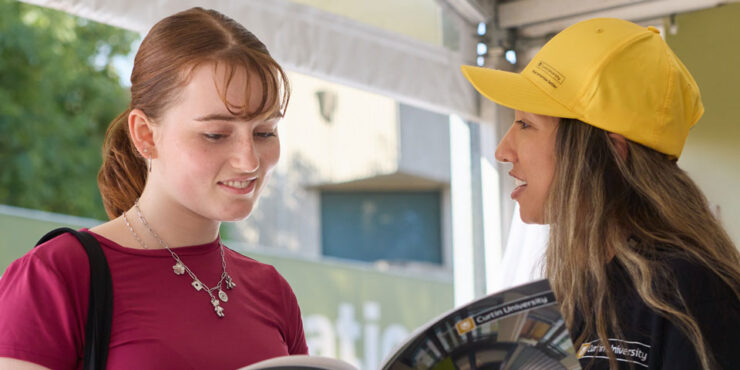Course overview
Curtin’s Bachelor of Engineering offers you an immersive, industry-connected university experience. Our aim is for you to graduate with the expertise to devise engineering solutions to societal and industry challenges, to improve the quality of life for communities all around the world.
Your studies will begin with the Engineering Foundation Year (EFY). Designed in consultation with industry, the EFY gives you the fundamental concepts and skills required by all areas of engineering. Importantly, the EFY allows you to explore Curtin’s range of engineering majors before choosing your major.
These are the engineering majors that you can choose from:
Professional accreditation and recognition
Curtin’s Bachelor of Engineering (Honours) is accredited by Engineers Australia (EA) and recognised internationally. Curtin proactively seeks course accreditation by EA, ensuring that graduates have professional recognition in Australia and by international signatories to the Washington Accord.
As EA accreditation is based on graduate outcomes, a new or recently established course may be granted provisional accreditation until it has attained the threshold number of graduates required for full accreditation.
Provisional accreditation indicates that the course meets the accreditation criteria to the extent possible at the time of evaluation and is likely to be granted full accreditation in the future. Energy Engineering, Industrial and Systems Engineering, and Software Systems Engineering are recently established courses seeking provisional accreditation.
Why study at Curtin?
Industry accredited
Curtin's Bachelor of Engineering (Honours) is accredited by Engineers Australia (EA) and recognised internationally.
Select your engineering field
Our award-winning Engineering Foundation Year lets you experience a range of engineering fields, to ensure you choose the right career for you.
Immersive learning facilities
Curtin's purpose-designed Engineering Pavilion includes a dedicated first-year studio and project rooms.
Your student experience

Work-integrated learning at Curtin: explore a Universe of opportunity
Develop real-world experience before you graduate. Learn how work-integrated learning helps you build career skills and connect with industry early.

Thinking about uni? Five reasons Curtin could be your best move
Not sure if uni is for you? Explore five clear reasons students choose Curtin – from flexible pathways and support to real-world skills and outcomes.

Find your entry pathway to Curtin
You may be finishing high school, coming from TAFE, or just thinking of a career change; but whatever your background, there’s an entry pathway to Curtin for you.
Other study options
Double degrees
You can extend your expertise and career opportunities by combining your Engineering degree with a choice of degrees from across Science, Humanities, and Business and Law. Visit the specific Engineering major pages to see the double degrees available.
Upcoming events

29 March 2026
Curtin Open Day
Curtin Perth
Discover where in the world a Curtin Degree can take you at Curtin Open Day. Explore courses that connect with industry, meet people who can guide your career direction and see how your ideas can become a reality.
Course structure
Engineering Foundation Year
The EFY will give you a comprehensive grounding in theory, and you’ll gain strong practical skills in our dedicated first-year engineering studio.
It includes:
- interactive lectures
- small group tutorials and workshops
- hands-on physical and computer laboratories
- team-based design and simulation projects
- portfolio development, with an emphasis on reflection and self-evaluation
- participation by industry representatives.
You’ll also develop professional career skills such as cultural awareness and an understanding of major societal challenges – such as climate change and energy transition – that engineers have an increasing role in addressing.
Overall, the EFY and its support services will help you progress smoothly into your chosen major.
First-year studio
The first-year studio and project rooms reflect the modern working environment, so that you become familiar with the layout of a professional industry setting. The studio is also a vibrant hub to develop social and academic networks. It features an open-plan office, project meeting rooms, and computing, electrical and mechanics laboratories.
Years 2–4
Following your EFY, you’ll study units relevant to your chosen major. You can also choose to undertake research or study specialisations beyond your major, giving you the flexibility to broaden or deepen your expertise.
In your fourth year, you’ll complete an honours-level research project. This experience will not only give you an in-depth understanding of your minor thesis or project topic, it will also demonstrate to employers your ability to plan and complete a complex body of work within deadlines.
Professional practice
To graduate with a Bachelor of Engineering (Honours), you must complete 480 hours of engagement with professional engineering practice. This can comprise a combination of real-world experiences – such as paid and voluntary work placements, working on university-based industry projects, attending extra-curricular technical lectures and workshops, and industry site visits in Australia or overseas.
Detailed course structure and unit information
For detailed information and course structure, visit our Handbook.
Customise your degree
Curtin offers a choice of 11 majors that will launch the right career for you:
Entry requirements
To study this course, you must meet the entry criteria:
- course ATAR, or equivalent, demonstrated via an accepted entry pathway
- any course-specific requirements
- English language requirement.
Guaranteed entry
If you achieve the guaranteed ATAR/selection rank for this course and meet all other entry requirements, you’re guaranteed a place in this course.
Entry pathways
There are different ways to meet our academic entry requirements. Choose the option that best suits the highest level of education that you’ve achieved.
Curious how students entered this course? See the entry pathways other students have taken.
Course-specific requirements
You’ll also need to meet any specific requirements to be eligible to apply for this course.
Study credit and support
You may be able to receive study credit or support based on your previous experience or personal circumstances.
Get credit towards your degree
You may be able to receive credit for recognised learning (CRL) from past study or professional experience, which could reduce the time it takes to finish your course.
Find specific details about CRL for this course on the Handbook.
Special consideration
If your studies were affected by circumstances beyond your control, you may be eligible for special consideration when applying to Curtin. This process is available to new applicants only and allows your application to be assessed in light of those circumstances.
Additional information
Notes about this course
Make sure you check the course notes for any other important information.
Fees
2026 Domestic indicative fees
*The indicative first-year fee is based on a standard full-time study load of 200 credit points.
This fee is a guide only. Your total fee may vary depending on the units you choose, your study load or if your course includes additional requirements. For more information on fees, see other fees and charges.
Scholarships
Get the support you need to succeed with our diverse range of scholarships. Whether it’s financial support, assistance with relocation, or recognition for your academic achievements, we have scholarships tailored to your unique needs.
How to apply
Follow these steps to make sure you’re eligible, prepared and ready to apply for your course.
Check entry requirements
Entry requirements differ by course and your previous work and study experience.
Prepare your documents
The documents you need may vary depending on your course and application pathway.
Check application deadlines
Deadlines vary by course and whether you’re applying as a domestic or international student.
Choose your application pathway
I’m in year 12 or applying for Medicine
If you’re in year 12 or recently finished high school, you’ll need to apply through TISC.
You’ll apply through TISC no matter what you studied in high school, whether that was:
- ATAR
- General subjects
- Certificate IV
- or completing UniReady in Schools program.
TISC has different application dates to Curtin. Visit the TISC website for all important dates, including application deadlines.
I have finished high school
If you’re not a current year 12 student or recent graduate, you’re considered a non school leaver and you’ll apply directly to Curtin.
The only exception is Medicine, which must be applied for through TISC.
You’ll apply directly to Curtin if you are:
- a high school graduate who finished school last year or earlier
- transferring from another university
- returning to study or using your professional experience to qualify
- progressing from a VET or TAFE qualification or bridging program
- a current Curtin student changing courses or campuses.
Application deadlines can vary by course. Make sure to check application deadlines before you apply.
Express your interestExplore more
Find more resources to help you take the next step in your Curtin journey.